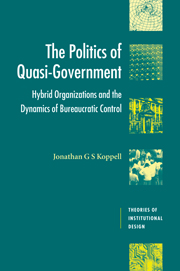Book contents
- Frontmatter
- Contents
- List of figures
- List of tables
- Acknowledgments
- List of acronyms
- 1 Introduction
- 2 Building a better model of bureaucratic control
- 3 Administration by regulation
- 4 Principal's preference, organizational structure and the likelihood of control
- 5 Hybrid organizations and the alignment of interests
- 6 The limits of congressional control: agent structure as constraint
- 7 Regulating hybrids: structure and control
- 8 Conclusion
- Appendix: background of organizations studied
- Interview subjects
- References
- Index
8 - Conclusion
Published online by Cambridge University Press: 22 September 2009
- Frontmatter
- Contents
- List of figures
- List of tables
- Acknowledgments
- List of acronyms
- 1 Introduction
- 2 Building a better model of bureaucratic control
- 3 Administration by regulation
- 4 Principal's preference, organizational structure and the likelihood of control
- 5 Hybrid organizations and the alignment of interests
- 6 The limits of congressional control: agent structure as constraint
- 7 Regulating hybrids: structure and control
- 8 Conclusion
- Appendix: background of organizations studied
- Interview subjects
- References
- Index
Summary
Hybrid organizations are less likely than traditional government agencies to satisfy the policy preferences of their principals – Congress and the President. That is, hybrids are more difficult to control than agencies. This conclusion is not intended nor should it be read as a searing indictment of quasi-government. It is simply a neutral observation.
This observation does have significant implications. Although hybrids are not bad or inappropriate policy tools in all situations, they clearly pose novel challenges that ought to be addressed by policy-makers before they dive head first into the waters of quasi-government. Can a hybrid be regulated effectively? Is the achievement of a policy goal critical or merely desirable? Most fundamentally, what are the political costs of quasi-government?
This book has demonstrated that part of the price is a loss of control over public policy. Hybrid organizations can do many things and have contributed to the public good of the United States. However, it is clear that, as instruments of elected officials, they are unwieldy and unpredictable. This conclusion alone does not close the door to quasi-government. Control is but one aspect of accountability. Indeed, critics of government bureaucracy argue that reducing the control wielded by elected principals is the key to improving the performance of public agencies! The creation of additional hybrid organizations (and other novel institutional arrangements) in the public sector needs to be accompanied by a reconsideration of our notions of accountability – a key concept at the foundation of American public administration.
- Type
- Chapter
- Information
- The Politics of Quasi-GovernmentHybrid Organizations and the Dynamics of Bureaucratic Control, pp. 164 - 185Publisher: Cambridge University PressPrint publication year: 2003



